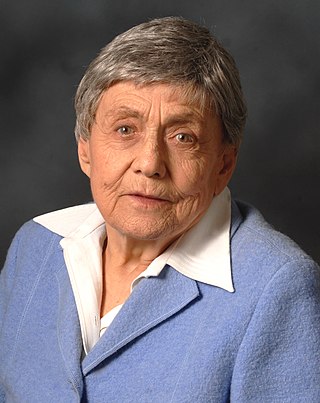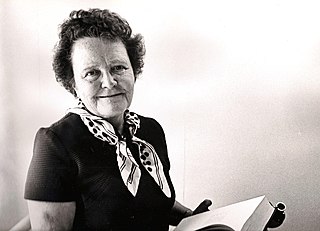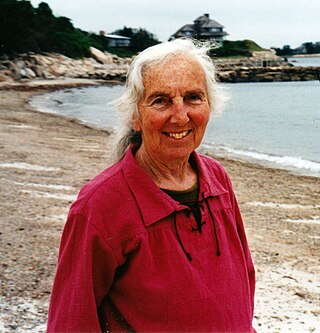
Susan Lee Lindquist, ForMemRS was an American professor of biology at MIT specializing in molecular biology, particularly the protein folding problem within a family of molecules known as heat-shock proteins, and prions. Lindquist was a member and former director of the Whitehead Institute and was awarded the National Medal of Science in 2010.

Shirley Marie Tilghman, is a Canadian scholar in molecular biology and an academic administrator. She is now a professor of molecular biology and public policy and president emerita of Princeton University. In 2002, Discover magazine recognized her as one of the 50 most important women in science.

Ruth Barcan Marcus was an American academic philosopher and logician best known for her work in modal and philosophical logic. She developed the first formal systems of quantified modal logic and in so doing introduced the schema or principle known as the Barcan formula. Marcus, who originally published as Ruth C. Barcan, was, as Don Garrett notes "one of the twentieth century's most important and influential philosopher-logicians". Timothy Williamson, in a 2008 celebration of Marcus' long career, states that many of her "main ideas are not just original, and clever, and beautiful, and fascinating, and influential, and way ahead of their time, but actually – I believe – true".

Ruth Myrtle Patrick was an American botanist and limnologist specializing in diatoms and freshwater ecology. She authored more than 200 scientific papers, developed ways to measure the health of freshwater ecosystems and established numerous research facilities.

Daphne Koller is an Israeli-American computer scientist. She was a professor in the department of computer science at Stanford University and a MacArthur Foundation fellowship recipient. She is one of the founders of Coursera, an online education platform. Her general research area is artificial intelligence and its applications in the biomedical sciences. Koller was featured in a 2004 article by MIT Technology Review titled "10 Emerging Technologies That Will Change Your World" concerning the topic of Bayesian machine learning.
The Cockrell School of Engineering is one of the eighteen colleges within the University of Texas at Austin. It has more than 8,000 students enrolled in eleven undergraduate and thirteen graduate programs. Annual research expenditures are over $267 million and the school has the fourth-largest number of faculty in the National Academy of Engineering.

Ruth Hubbard was a professor of biology at Harvard University, where she was the first woman to hold a tenured professorship position in biology.

JoAnne Stubbe is an American chemist best known for her work on ribonucleotide reductases, for which she was awarded the National Medal of Science in 2009. In 2017, she retired as a professor of chemistry and biology at the Massachusetts Institute of Technology.
Sharon Mosher is an American geologist. She did her undergraduate work at University of Illinois Urbana-Champaign. After earning an MSc from Brown University, she returned to the University of Illinois to get her PhD in Geology in 1978. Since 2001 she has held the William Stamps Farish Chair at University of Texas, and, since 2009 she has served as the dean of the Jackson School of Geosciences at Texas. In 2013 she became the president of the American Geosciences Institute.

Judith P. Klinman is an American chemist, biochemist, and molecular biologist known for her work on enzyme catalysis. She became the first female professor in the physical sciences at the University of California, Berkeley in 1978, where she is now Professor of the Graduate School and Chancellor's Professor. In 2012, she was awarded the National Medal of Science by President Barack Obama. She is a member of the National Academy of Sciences, American Academy of Arts and Sciences, American Association for the Advancement of Science, and the American Philosophical Society.

Jill P. Mesirov is an American mathematician, computer scientist, and computational biologist who is the Associate Vice Chancellor for Computational Health Sciences at the University of California, San Diego. She previously held an adjunct faculty position at Boston University and was the associate director and chief informatics officer at the Eli and Edythe L. Broad Institute of MIT and Harvard.

Blossom Damania is a virologist at the University of North Carolina at Chapel Hill. She is known for her work on oncogenic viruses that cause human cancer. Damania has also been serving as vice dean for research at the UNC Chapel Hill School of Medicine since 2016.
Kara M. Kockelman, Ph.D., P.E. is an American civil and transportation engineer, who is currently the Dewitt Greer Centennial Professor of Transportation Engineering at the University of Texas at Austin, previously the Clare Boothe Luce Professor of Civil Engineering, and a published author. Kockelman’s work focuses on transportation, and includes planning for future implementation of shared and autonomous vehicle systems, and policies like credit-based congestion pricing and urban growth boundaries.
Zengjian Jeffrey Chen is a plant biologist and molecular geneticist, currently the D. J. Sibley Centennial Professor of Plant Molecular Genetics at University of Texas at Austin. Chen received his B.S. at Zhejiang Agricultural University, M.S. at Nanjing Agricultural University, and Ph.D. in Genetics at Texas A&M University. Following a postdoctoral position at University of Minnesota and as an NIH Postdoctoral Fellow at Washington University in St. Louis, he joined the faculty at Texas A&M in 1999, where he was promoted to the rank of associate professor with tenure. In 2005, he moved to The University of Texas at Austin and became a full professor in 2008 in the Departments of Molecular Biosciences and lntegrative Biology, Center for Computational Biology and Bioinformatics, and Institute for Cellular and Molecular Biology.
Ruth Geyer Shaw is a professor and principal investigator in the Department of Ecology, Evolution and Behavior at the University of Minnesota. She studies the processes involved in genetic variation, specializing in plant population biology and evolutionary quantitative genetics. Her work is particularly relevant in studying the effects of stressors such as climate instability and population fragmentation on evolutionary change in populations. She has developed and applied new statistical methods for her field and is considered a leading population geneticist.
Andrea C. Gore is a neuroendocrinology professor at the University of Texas at Austin in the Division of Toxicology and Pharmacology, where she holds the Vacek Chair of Pharmacology. She is a prominent contributor to the field of reproductive endocrinology. Her research interests span from the neurological basis of reproductive aging to endocrine disruptors in the nervous system. From January 2013 through December 2017, she was Editor-in-Chief of the journal Endocrinology. She has also been elected into the Fellow to the American Association for the Advancement of Science.
Christine E. Schmidt is an American biomedical engineer. As a professor at the University of Florida, Schmidt was inducted into the Florida Inventors Hall of Fame for her creation of the Avance Nerve Graft which has "improved the lives of numerous patients suffering from peripheral nerve damage." In 2024, Schmidt was elected to both the National Academy of Engineering and the National Academy of Medicine.
Maggie Miller is a mathematician and an assistant professor in the mathematics department at the University of Texas at Austin. She was also a former Visiting Clay Fellow, and Stanford Science Fellow at Stanford University in the Mathematics Department. Her primary research area is low-dimensional topology.
Lauren O'Connell is an American neurobiologist and associate professor in the Department of Biology at Stanford University, specializing in the intersections of behavioral neuroscience, ecology, and evolution. Her research considers how animals handle challenges in their environment. She received a L'Oréal-USA For Women in Science fellowship in 2015.









